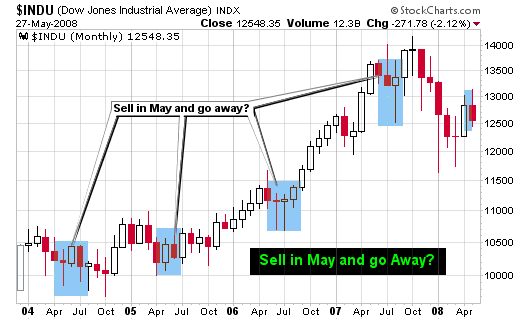It’s that time of year again, “Sell in May and Go Away”, so I will upload up my annual post of statistics using the help of the Stock Trader’s Almanac written by Jeffery A. Hirsch and Yale Hirsch.

For the record, I don’t sell just because the calendar says May but I do enjoy sharring the statistical data (it is very interesting):
Worst six months of the year begin in May:
* All data is from the DJIA from 1950 to 2005
- A $10,000 investment in the DJIA compounded to $544,323 for the period beginning in November through April over the past 56 years (termed the best six months)
- Compare this to a $272 loss; yes I said loss for the same investment in May through October (termed the worst six months)
- 44 of the 56 periods ended with a gain in the November through April period
- Only 33 periods ended with a gain versus 23 losing periods in May through October
- The average gain for the November through April period is 7.9% (56 yrs)
- The average gain for May through October is 0.3% but the period did have an overall loss of $272 as mentioned above
- The best six months gained 11,691.79 Dow points over the 56 yrs (data ends in 2005)
- The worst six months actually lost 538.98 Dow points
- Top performing period for best six months was a gain of 29.8% in 1985 and then 25.6% in 1998
- Top performing period for worst six months was a gain of 19.2% in 1958 and then 16.9% in 1982
- The poorest performing period for the best six months was a loss of 14.0% in 1969 and then 12.5% in 1973
- The poorest performing period for the worst six months was a loss of 25.2% in 2002 and then 22.4% in 1974
- The best six months has only had one losing period in the past 22 years and that was only 2.2%
- The worst six months has had eight losing periods over the past 22 years with several in double digits
- Seven of the past eight years have been losers for the worst six months
- All of these results are based without timing the market using technical analysis
- Using a simple MACD indicator to time the entries and exits, the gain during the best six months rises up to $1,548,121 while the loss during the worst six months increases to $6,646.
- Finally, five of the last nine May months have been down for the markets; starting the period of the “worst six months”
One side note: the Stock Trader’s Almanac notes that the Nasdaq actually has a best eight month period from November to June.
For further detail, grab a copy of the Almanac as I buy one every year for the excellent statitical information and the great quotes.
For all CP sell articles, visit my category on selling or short selling!



Connect with Me